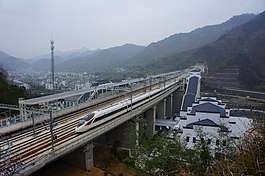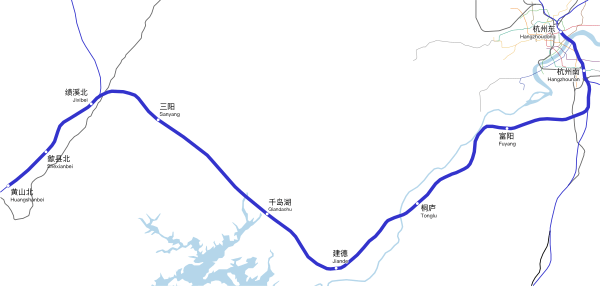Hangzhou–Huangshan intercity railway
Hangzhou–Huangshan intercity railway (simplified Chinese: 杭州至黄山高速铁路; traditional Chinese: 杭州至黃山高速鐵路; pinyin: hángzhōu huángshān gāosù tiělù) or Hanghuang ICR (simplified Chinese: 杭黄高铁; traditional Chinese: 杭黃高鐵; pinyin: hánghuáng gāotiě) is a dual-track, electrified, high-speed rail line between Hangzhou, Zhejiang and Huangshan, Anhui. The line runs 265 km (165 mi) through northwestern Zhejiang and southern Anhui and accommodates trains traveling at speeds up to 250 km/h (160 mph).[1][2] Travel time from Hangzhou to Huangshan was reduced to about one and one-half hour.[1] The line is the first rail link between the two cities and brings counties in mountainous southern Anhui closer to the Yangtze River Delta region. Construction began on June 30, 2014, and the line opened on December 25, 2018.
| Hangzhou–Huangshan intercity railway 杭州至黄山高速铁路 | ||||||||||||||||||||||||||||||||||||||||||||||||||||||||||||||||||||||||||||||||||||||||||||||||||||||||||||||||||||||||||||||||||||||||||||||||||||||||||||||||||||||||||||||||
|---|---|---|---|---|---|---|---|---|---|---|---|---|---|---|---|---|---|---|---|---|---|---|---|---|---|---|---|---|---|---|---|---|---|---|---|---|---|---|---|---|---|---|---|---|---|---|---|---|---|---|---|---|---|---|---|---|---|---|---|---|---|---|---|---|---|---|---|---|---|---|---|---|---|---|---|---|---|---|---|---|---|---|---|---|---|---|---|---|---|---|---|---|---|---|---|---|---|---|---|---|---|---|---|---|---|---|---|---|---|---|---|---|---|---|---|---|---|---|---|---|---|---|---|---|---|---|---|---|---|---|---|---|---|---|---|---|---|---|---|---|---|---|---|---|---|---|---|---|---|---|---|---|---|---|---|---|---|---|---|---|---|---|---|---|---|---|---|---|---|---|---|---|---|---|---|---|
 A CR400BF train at Sanyang railway station, Anhui | ||||||||||||||||||||||||||||||||||||||||||||||||||||||||||||||||||||||||||||||||||||||||||||||||||||||||||||||||||||||||||||||||||||||||||||||||||||||||||||||||||||||||||||||||
| Overview | ||||||||||||||||||||||||||||||||||||||||||||||||||||||||||||||||||||||||||||||||||||||||||||||||||||||||||||||||||||||||||||||||||||||||||||||||||||||||||||||||||||||||||||||||
| Other name(s) | Hanhuang ICR (simplified Chinese: 杭黄高铁; traditional Chinese: 杭黃高鐵; pinyin: hánghuáng gāotiě) | |||||||||||||||||||||||||||||||||||||||||||||||||||||||||||||||||||||||||||||||||||||||||||||||||||||||||||||||||||||||||||||||||||||||||||||||||||||||||||||||||||||||||||||||
| Type | Commuter rail | |||||||||||||||||||||||||||||||||||||||||||||||||||||||||||||||||||||||||||||||||||||||||||||||||||||||||||||||||||||||||||||||||||||||||||||||||||||||||||||||||||||||||||||||
| Status | operational | |||||||||||||||||||||||||||||||||||||||||||||||||||||||||||||||||||||||||||||||||||||||||||||||||||||||||||||||||||||||||||||||||||||||||||||||||||||||||||||||||||||||||||||||
| Locale | Hangzhou, Zhejiang and Huangshan, Anhui | |||||||||||||||||||||||||||||||||||||||||||||||||||||||||||||||||||||||||||||||||||||||||||||||||||||||||||||||||||||||||||||||||||||||||||||||||||||||||||||||||||||||||||||||
| Stations | 2 | |||||||||||||||||||||||||||||||||||||||||||||||||||||||||||||||||||||||||||||||||||||||||||||||||||||||||||||||||||||||||||||||||||||||||||||||||||||||||||||||||||||||||||||||
| Operation | ||||||||||||||||||||||||||||||||||||||||||||||||||||||||||||||||||||||||||||||||||||||||||||||||||||||||||||||||||||||||||||||||||||||||||||||||||||||||||||||||||||||||||||||||
| Opened | 25 December 2018 | |||||||||||||||||||||||||||||||||||||||||||||||||||||||||||||||||||||||||||||||||||||||||||||||||||||||||||||||||||||||||||||||||||||||||||||||||||||||||||||||||||||||||||||||
| Rolling stock | CR400BF | |||||||||||||||||||||||||||||||||||||||||||||||||||||||||||||||||||||||||||||||||||||||||||||||||||||||||||||||||||||||||||||||||||||||||||||||||||||||||||||||||||||||||||||||
| Technical | ||||||||||||||||||||||||||||||||||||||||||||||||||||||||||||||||||||||||||||||||||||||||||||||||||||||||||||||||||||||||||||||||||||||||||||||||||||||||||||||||||||||||||||||||
| Line length | 265 km (164.66 mi) | |||||||||||||||||||||||||||||||||||||||||||||||||||||||||||||||||||||||||||||||||||||||||||||||||||||||||||||||||||||||||||||||||||||||||||||||||||||||||||||||||||||||||||||||
| Number of tracks | 2 | |||||||||||||||||||||||||||||||||||||||||||||||||||||||||||||||||||||||||||||||||||||||||||||||||||||||||||||||||||||||||||||||||||||||||||||||||||||||||||||||||||||||||||||||
| Track gauge | 1,435 mm (4 ft 8 1⁄2 in) | |||||||||||||||||||||||||||||||||||||||||||||||||||||||||||||||||||||||||||||||||||||||||||||||||||||||||||||||||||||||||||||||||||||||||||||||||||||||||||||||||||||||||||||||
| Electrification | Overhead lines (AC 25 kV) | |||||||||||||||||||||||||||||||||||||||||||||||||||||||||||||||||||||||||||||||||||||||||||||||||||||||||||||||||||||||||||||||||||||||||||||||||||||||||||||||||||||||||||||||
| Operating speed | 250 km/h | |||||||||||||||||||||||||||||||||||||||||||||||||||||||||||||||||||||||||||||||||||||||||||||||||||||||||||||||||||||||||||||||||||||||||||||||||||||||||||||||||||||||||||||||
| ||||||||||||||||||||||||||||||||||||||||||||||||||||||||||||||||||||||||||||||||||||||||||||||||||||||||||||||||||||||||||||||||||||||||||||||||||||||||||||||||||||||||||||||||
Route
The high-speed rail line is connecting southern Anhui Province with the Hangzhou, on the eastern seaboard, via northwestern Zhejiang province. Cities and towns along route include Hangzhou, Fuyang, Tonglu, Xiaoshan, Jiande, Chun’an in Zhejiang, and Jixi, She County, and Huangshan in Anhui.[2] At its eastern terminus, Hangzhou, the line is linked to the high-speed rail lines to Shanghai and Nanjing. At its western terminus, Huangshan, the line connects to the Hefei–Fuzhou high-speed railway. Scenic sites along route include Huangshan (Yellow Mountain), the ancient villages in southern Anhui, Qiandao Lake, and Hangzhou.

History
The Hanghuang high-speed rail project was initially approved by the State Development and Planning Commission in July 2010.[3] Construction was to begin later in that year and was scheduled to be completed by as early as 2013.[2] After two rounds of environmental assessments of surveys in 2010 and 2011, the project was revised.[1] In August 2013, planners announced that the route would run 183.4 km (114.0 mi) in Zhejiang and 81.7 km (50.8 mi) in Anhui with 10 stations, including eight new stations.[1] Two stations, Shexian South and Sanyang were added to the original plan, which had Hangzhou East, Hangzhou South, Fuyang, Tonglu, Jiande, Chunan, Jixi North and Huangshan North.[4] The Jiande-to-Jixi section of the line would use seamless steel rails laid on concrete rail bed.[1] The Xiaoshan South-to-Jiande and Jixi-to-Huangshan sections would have rail laid on conventional gravel beds.[1] The design speed of the railway was changed from an initial speed of 250 km/h (160 mph) with expansion capability for 350 km/h (220 mph) operation to 250 km/h without any expansion capability to higher speeds.[1] Construction began on June 30, 2014[5] and the line was opened on December 25, 2018.[6]
References
- 杭黄铁路方案进行环评公示有望年内动工 2018年通车. Hangzhou.com (in Chinese). August 21, 2013.
- 杭黄高铁通过国家立项 3年后杭州到黄山只要1小时(图) (in Chinese). August 6, 2010.
- NDRC (July 31, 2010). 新建杭州至黄山铁路项目建议书通过批复 (Press release) (in Chinese).
- 杭黄铁路确定年内开建 一个半小时到黄山. Hangzhou.com (in Chinese). September 12, 2013.
- 金黄铁路建设筹备组成立 打通金千铁路断头路. Sina.com (in Chinese). November 9, 2014.
- "杭黄高铁开通运营在即 24日起发售相关车票". China News Service. 2018-12-24.